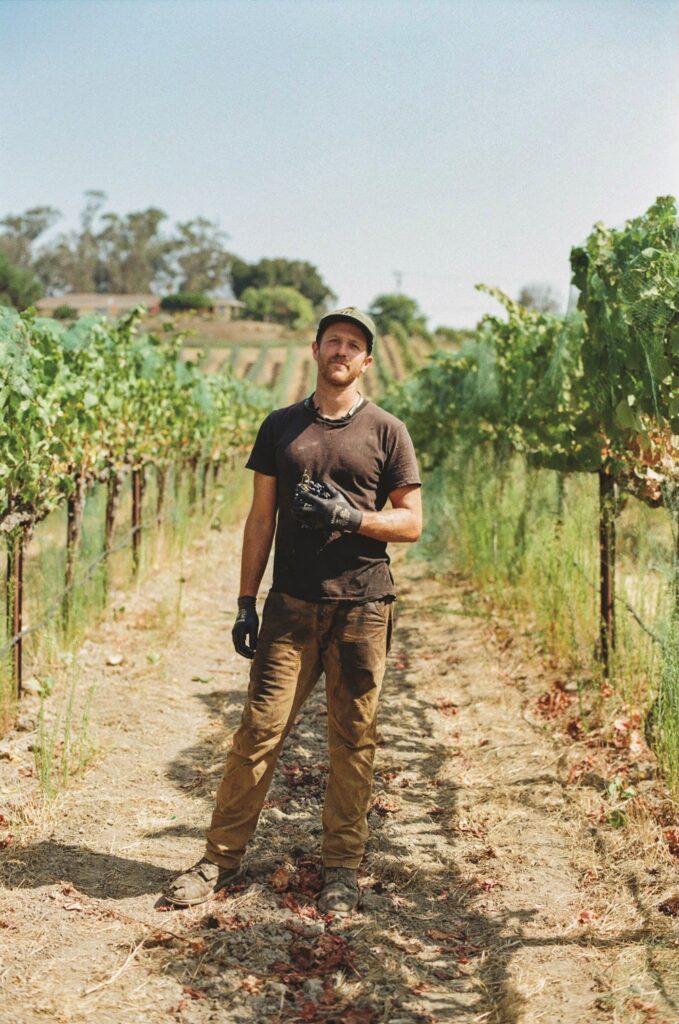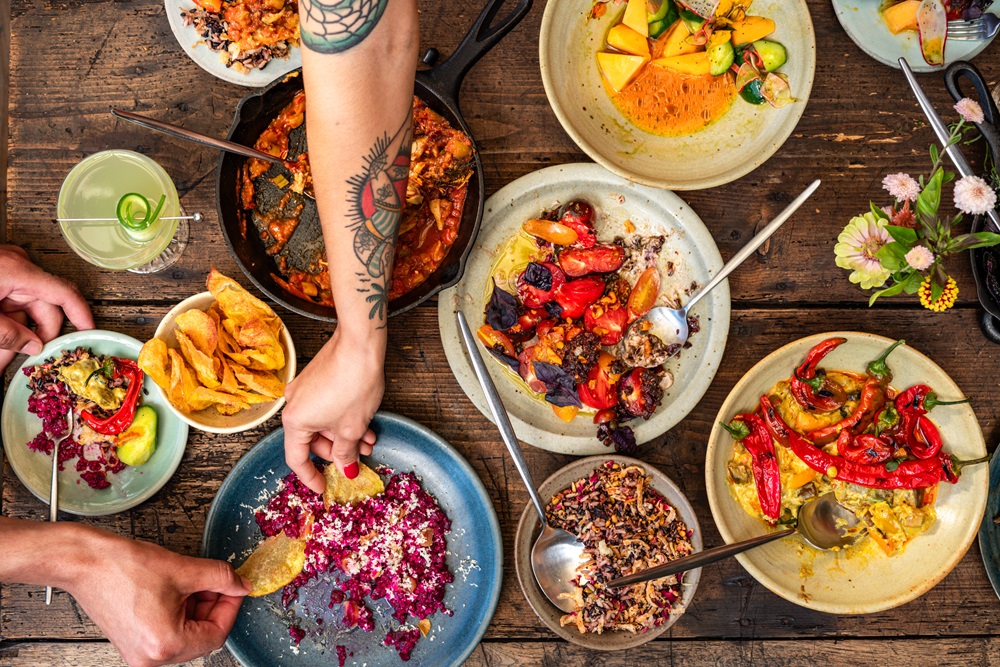Zero Foodprint Steps Up
How Food and Beverage Providers Are Changing Agriculture

What if part of the solution to climate change was just dining out at our favorite restaurants? Could it be that easy? It might be if the folks at Zero Foodprint have anything to do with it. Through small donations from local food systems, the Healdsburg-based Zero Foodprint (ZFP) funds grants that enable farms and ranches to make improvements that capture carbon from the atmosphere and store it underground, leading to better food quality, thriving farms, and a restored climate.
Here’s how it works in a nutshell: food and beverage business owners, like Naomi Crawford from Lunchette in Petaluma, become ZFP members. Their customers can then support ZFP with 1% on every purchase, contributing to a grant fund that ZFP awards to farmers and ranchers to help them implement regenerative agriculture practices like composting, planting cover crops, and planting hedgerows to sequester carbon. The program is flourishing across California and Colorado, with plans to expand into Oregon and Washington.
Crawford knew it was the right fit for Lunchette immediately. “They made it super easy,” she smiles, “and the impact is so great that we highly recommend that all food and beverage businesses join. The more we fund Zero Foodprint, the more grants they can give to our region’s farms who want to convert to or expand regenerative agricultural practices.”
Starting at the Source
ZFP Executive Director Myint and cofounders Chris Ying and Peter Freed started Zero Foodprint in 2014 to help restaurants reduce and eventually eliminate their climate impacts. In 2019, they merged with the Perennial Farming Initiative (PFI)—founded my Myint and his wife Kara Leibowitz—where they became a 501(c)(3) and launched Restore California. In this program, restaurants and other food businesses dedicate 1% of revenue to team up with farmers and directly accelerate the adoption of regenerative farming practices that promote carbon-rich, healthy soil.
When his daughter was born, Myint knew he wanted to be part of the solution. And he knew that restaurants were going to be part of it, having begun his career in the food industry and cofounding three San Francisco restaurants: Mission Street Food, named SF Chronicle’s Most Influential Restaurant of the Past Decade; Mission Chinese Food, a New York Times Restaurant of the Year in 2012; and The Perennial, which Bon Appetit called the “most sustainable restaurant in the country.”
After thoroughly analyzing the carbon footprint of his restaurant, Mission Chinese Food, Myint ultimately found that most of the emissions associated with a meal occur before the ingredients even reach the restaurant or processing facility. Additionally, a study published in 2021 by the UN Food and Agriculture Organization1 tells us that food and beverage production is responsible for over a third of global emissions, making it a great place for change.
“The challenge for the transition is the farmers don’t have the resources to make the switch,” says Myint. “In order to make real progress on climate, the food system needs a way to change farming.”
ZFP gives them those resources. How the money goes out is guided by new modeling tools, including the USDA’s COMET-Planner, an online tool designed to estimate the greenhouse gas (GHG) impacts of conservation practices like regenerative grazing on agricultural landscapes. Developed for preliminary planning on farms and ranches, it is based on research from Colorado State University, the U.S. Department of Agriculture (USDA), and the Natural Resources Conservation Service (NRCS).
Perucchi Dairy Makes Strides
When participating restaurants donate to the Zero Foodprint grant fund, then farmers and ranchers like Josh Perucchi, a third-generation dairy rancher with Sonoma County’s Perucchi Dairy, can apply for and receive grants to adopt climate-smart practices like composting, no-till farming, cover cropping, managed grazing, and planting hedgerows on their land. These simple techniques build healthy soil, which absorbs and stores carbon like a sponge. The soil sequesters carbon and produces more nutrient-rich food, enhancing biodiversity and crop yields.
“Overall, it’s a win-win for the environment and our grazing operation,” says Perucchi. “These practices are proven but expensive to implement, initially. Without the grant funding available, we could not implement these practices.”
Perucchi’s grandparents, Henry and Clara Perucchi, began the farm in 1952, and their son Steve now runs the farm. As the farm’s manager, Josh, Steve’s son, is actively implementing grant programs like Zero Foodprint that facilitate a shift to practices that build the soil and leave it better than before. The Sonoma County dairy has received two grants from Zero Foodprint to implement these strategies.
“We chose practices that made sense to our pasture operation and grazing of dairy cows,” says Perucchi. “As the soil improves with increased carbon, it holds more moisture and allows more plants to grow. This reduces the amount of feed we have to import and improves our bottom line. Also, it reduces the number of trucks on the road that have to haul feed from far away to our farm.”
Connor Murphy, the manager of Shone Farm, agrees, “The practices we put in place via the ZFP grant will allow our working lands to sequester nearly 500 tons of carbon over their lifetime,” he says. “Additionally, they showed us what could be possible, and we’ve since continued to spread large amounts of compost and install more hedgerows and native pollinator habitats.”
Shone Farm is Santa Rosa Junior College’s learning lab for the Agriculture and Natural Resources Department. They grow organic produce, plant propagation, olives, and grapes; raise cattle, sheep; and goats; and annually make about 600-700 cases of estate wine. Their CSA provides vegetables to students and staff, and also works with wholesalers FEED Sonoma and Farm to Pantry’s gleaning program.
“ZFP staff are intimately connected to the local food systems where they work, so they understood the challenges we were facing and how to navigate them,” Murphy adds.
Wine Win
Besides cattle and dairy, another top crop in Sonoma County is wine grapes, which accounted for 72,358 acres of farmland in the county in 2022. David Rothschild is the owner of Los Paisanos, a vineyard management company working to implement sustainable practices, and Las Vivas Wine and Olive Oil, where they farm 60 acres of grapes on Sonoma Mountain and South Petaluma and five acres of olives in the Carneros region. He credits ZFP for helping him calculate the most efficient use of regenerative agriculture methods like composting, hedgerows, and cover crops.
“I was already implementing all of these practices in my vineyards,” he explains, “but in collaboration with ZFP, we used the USDA COMET-Planner to determine what practices had the highest carbon sequestration benefits.”
It turns out that what’s good for the land is also good for Rothschild. “My observation has been that the longer I implement these practices, the more consistent my yields are in spite of yearly and seasonal variabilities, and,” he adds, “in the drought years specifically, I feel like my yields aren’t significantly lower when the county averages are down as a whole.”
Doing Good
80 restaurants have already committed to ZFP, from Michelin-starred restaurants like Healdsburg’s Single Thread to a Subway sandwich franchise in Boulder, Colorado. More than $3 million has been awarded to over 120 farm projects, with one-fifth of these projects funded here in Sonoma County. According to Forbes magazine, 88% of restaurant customers want businesses to address climate change.2 ZFP’s work has already resulted in an expected reduction of over 104,000 metric tons of carbon dioxide.
At Little Saint, a welcoming, cozy-lux vegan restaurant in Healdsburg, their ethos is rooted in climate justice and sustainable practices, including donating 1% of sales to ZFP and sourcing food from their own farm. “Zero Foodprint has created a path to drive change in an accessible way for busy restaurateurs, who often lack time or resources,” says Sara Beckstead, director of marketing at Little Saint. They make sure their team is invested in these values, too. “The Zero Foodprint leadership team has provided education tools and team training to our staff to better understand how our donations are driving real impact,” Beckstead adds.
It’s not always easy to know what to do about climate change or to do it, but ZFP offers a way to connect the dots between what and where we love to eat and how we treat the land and its farmers. When farmers can leave the soil better than before, the climate improves, food is more nutritious, and farmers have a better bottom line. And with restaurants like Little Saint and Lunchette on board, it’s easier and more delicious than ever to do good.
ccof.org/directory-member/perucchi-dairy
lunchettepetaluma.com | 25 4th Street, Petaluma | 10am–3pm Monday-Friday
littlesainthealdsburg.com | 25 North St, Healdsburg | 8am–10pm Thursday-Monday
Citations
1: UN Food and Agriculture Organization Study
2: Forbes Magazine article



